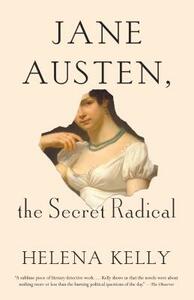Take a photo of a barcode or cover
I really loved this. I was fairly surprised how many reviewers on GR didn’t. I haven’t read other Jane Austen criticism, so maybe these ideas aren’t new to everyone, but I really liked getting the backgrounds on the stuff I wasn’t aware of (dates of events, what enclosure was all about, some of the other social knowledge that people of the time would have known that isn’t relevant in society today).
As another reviewer suggested, maybe I liked it because I want to read Jane Austen as a radical. Maybe it helped that most of the interpretations were new to me (or, at least, I’ve never read them from someone else before). Or maybe I just super love Jane Austen and enjoyed reading a book by someone who also loves her writing.
I thought the book was well-written, an enjoyable read and the author informed me of some things I didn’t know and suggested some ideas I want to think about it next time I read these books.
As another reviewer suggested, maybe I liked it because I want to read Jane Austen as a radical. Maybe it helped that most of the interpretations were new to me (or, at least, I’ve never read them from someone else before). Or maybe I just super love Jane Austen and enjoyed reading a book by someone who also loves her writing.
I thought the book was well-written, an enjoyable read and the author informed me of some things I didn’t know and suggested some ideas I want to think about it next time I read these books.
I only finished this book because a friend asked me to. And I gave it two starts rather than one because I know how hard it is to write a book. I've strained a muscle from all the eye-rolling. Too many sentences from the novels are out of context and from there become an outlandish premise that's not based on fact. The author doesn’t prove most of the claims she makes. Yes, Austen knew there were wars and class struggles and slavery and that people had sex! Not earth shattering news.
informative
reflective
sad
medium-paced
I absolutely loved this book! This is saying a lot as the introductions had a fictional Jane Austen scene and fictionalizing real people is a major pet peeve of mine. So informative about events in and adjacent to Jane’s life that gave me a fresh perspective on her work. However be warned you may never think the same of Mr Knightley again.
This book was given to me for Christmas, & as soon as I saw the title, I said, 'Not a very well kept secret.' The gift giver pointed out that when Jane Austen is mentioned, many people think Colin Firth in a wet shirt.
Fair enough. And once I started reading, it became evident how little I knew about her radicalism.
Helena Kelly analyses Austen's 6 published novels by submerging them in their historical era (both when first printed & when originally written), explaining Austen's meticulous language choices, & setting forth the social/legal (are you a treasonous writer?)/moral barriers Austen faced not simply as an early 19th century author, but as a female author.
Considering what information it covers, this book is incredibly reader friendly. Kelly writes complex 19th century societal issues with such clarity, they become the most fascinating & easy to read aspects of the book. She expects her reader to know the novels' plots & characters, giving the barest of synopses, but any of her readers can find plenty of online sources for Austen's plots.
The only criticism I have for Kelly is her fascination with Austen's word choice. No doubt that Austen is a master wordsmith, but Kelly recites how many times certain words are used in one novel as compared to how many times the same word is used in the other 5. By this, I mean she says, word X appears 245 times in novel A as compared to 7 times in novel B. Frequently, after giving these numbers, Kelly then asks why Austen made those decisions instead of others - radical, you think? Hmm? Hmm? Hmm?????? I periodically had to remind myself this was scholastic debate, not conspiracy theory. (And to be clear, nothing Kelly suggests is in the least bit unhinged.)
Kelly did use plot in Pride & Prejudice (& to a much lesser extent in Emma) to further illustrate her perspective on just how radical Austen was. This gave me a broader appreciation of both novels (& a little bit of horror at Mr Knightly's character). I would've loved her to address the plot of all Austen's novels.
The last sentence of Kelly's book is, Read them again. Many of her readers will be inspired to do just that.
Fair enough. And once I started reading, it became evident how little I knew about her radicalism.
Helena Kelly analyses Austen's 6 published novels by submerging them in their historical era (both when first printed & when originally written), explaining Austen's meticulous language choices, & setting forth the social/legal (are you a treasonous writer?)/moral barriers Austen faced not simply as an early 19th century author, but as a female author.
Considering what information it covers, this book is incredibly reader friendly. Kelly writes complex 19th century societal issues with such clarity, they become the most fascinating & easy to read aspects of the book. She expects her reader to know the novels' plots & characters, giving the barest of synopses, but any of her readers can find plenty of online sources for Austen's plots.
The only criticism I have for Kelly is her fascination with Austen's word choice. No doubt that Austen is a master wordsmith, but Kelly recites how many times certain words are used in one novel as compared to how many times the same word is used in the other 5. By this, I mean she says, word X appears 245 times in novel A as compared to 7 times in novel B. Frequently, after giving these numbers, Kelly then asks why Austen made those decisions instead of others - radical, you think? Hmm? Hmm? Hmm?????? I periodically had to remind myself this was scholastic debate, not conspiracy theory. (And to be clear, nothing Kelly suggests is in the least bit unhinged.)
Kelly did use plot in Pride & Prejudice (& to a much lesser extent in Emma) to further illustrate her perspective on just how radical Austen was. This gave me a broader appreciation of both novels (& a little bit of horror at Mr Knightly's character). I would've loved her to address the plot of all Austen's novels.
The last sentence of Kelly's book is, Read them again. Many of her readers will be inspired to do just that.
Fascinating read! But the author did Knightley so dirty
An interesting but also at times frustrating read.
I was not impressed by the little fictional sections at the start of each chapter and felt that they added nothing to the text. I also hated the way Kelly consistently referred to Jane Austen as Jane as if she were her personal friend - that really irritated me.
Overall I found her conclusions to be hit and miss. Some things were incredibly interesting and I did learn a few things. However, there were also more than a few occasions where I felt that the conclusions were reached after some rather wild leaps of logic or with very little evidence. (Edward Ferrars' apparent sexual appetites for one. Harriet Smith's possible parentage for another.)
Nothing incredibly eye-opening here, at least the plausible theories weren't. A good read but the author's proprietary attitude toward Austen and her works - as if she was the only one who really knew Austen, and her reading of the novels was the only true one - kept me from really enjoying it.
I was not impressed by the little fictional sections at the start of each chapter and felt that they added nothing to the text. I also hated the way Kelly consistently referred to Jane Austen as Jane as if she were her personal friend - that really irritated me.
Overall I found her conclusions to be hit and miss. Some things were incredibly interesting and I did learn a few things. However, there were also more than a few occasions where I felt that the conclusions were reached after some rather wild leaps of logic or with very little evidence. (Edward Ferrars' apparent sexual appetites for one. Harriet Smith's possible parentage for another.)
Nothing incredibly eye-opening here, at least the plausible theories weren't. A good read but the author's proprietary attitude toward Austen and her works - as if she was the only one who really knew Austen, and her reading of the novels was the only true one - kept me from really enjoying it.
challenging
informative
medium-paced
informative
slow-paced



